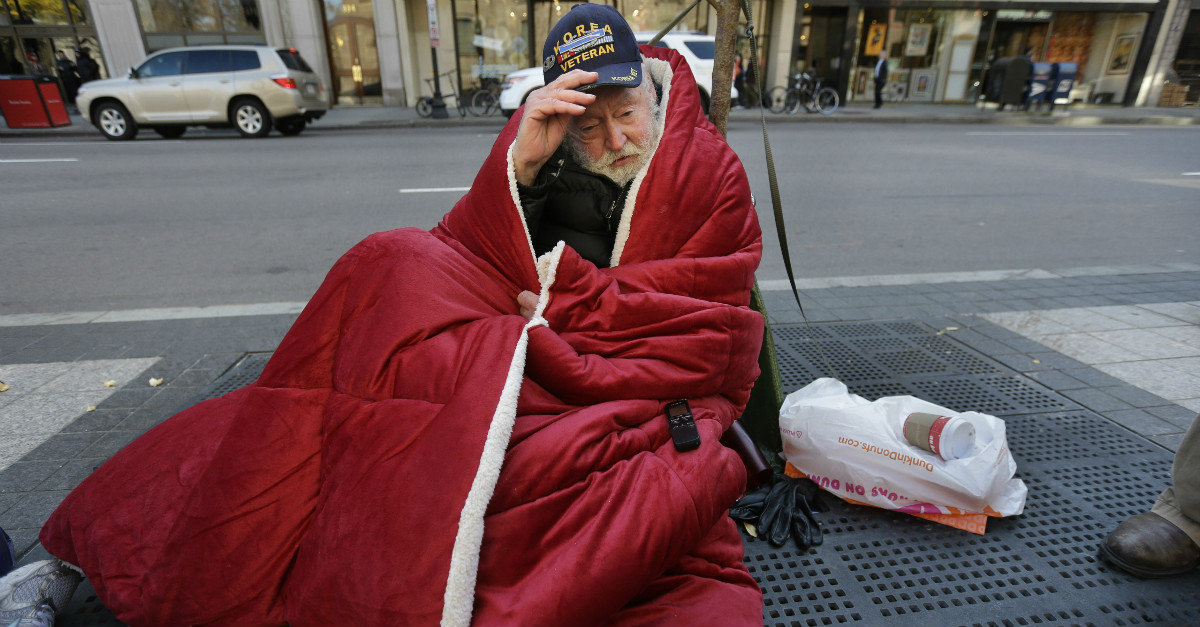There is a lot to dislike about the budget proposal President Trump released last week, no matter where you fall on the political spectrum.
Videos by Rare
Fiscal conservatives are correct to suspect most of its cuts will not survive the trip through Congress while its spending increases will make it through just fine. The military spending hike is an absurdist exercise in irresponsibility and recklessness given the Pentagon’s already-enormous budget, rampant waste, and utter lack of financial accountability.
But for critics from the left, perhaps the budget’s greatest failure is the fact that it does a reverse Robin Hood, finding the funds for new heights of military profligacy in part in the coffers of federal programs that help the poor. As CNN’s Rachel Black details in a piece listing the budget’s “cruelest cuts,” Trump’s plan would eliminate a grant program “to fund services for poor seniors, including Meals on Wheels, a food assistance program serving almost 2.5 million low-income seniors in 2015.”
RELATED: Why Donald Trump’s budget will end up increasing spending
The Trump budget also cuts heating bill assistance for poor families—which has been linked to a decrease in underweight infants, as it keeps families from having to decide between heat and food—and, among other programs, after-school meals for kids who may not be fed well at home and nutritional assistance for low-income pregnant women.
It’s not hard to see why people are upset. As much as the Trump administration might protest to the contrary, there’s evidence that these programs do help people in need. “We serve more than 2.4 million seniors from 60 to 100+ years old each year,” Meals on Wheels said in response to the proposed cuts. “They are primarily older than 60 and because of physical limitations or financial reasons, have difficulty shopping for or preparing meals for themselves.”
A study from 2013 found this type of meal delivery program for the elderly can “significantly improve diet quality, increase nutrient intakes, and reduce food insecurity and nutritional risk.” Participants tend to live longer, and they stay out of costly assisted living facilities longer, too.
‘But wait a minute,’ a regular reader might say, ‘I thought you were a libertarian. Doesn’t that mean opposing social welfare programs?’
Indeed it does. But here’s the thing: I can agree these programs are not government’s proper responsibility while admitting they do some real good (an admission, by the way, which does not preclude my conviction that voluntary, private charities could do much more good). And I can fully support transitioning away from the government helping people in need while recognizing there are people who really do need that help right now.
In fact, I’ve long believed that there’s a good fiscal conservative case for shutting up about social welfare sometimes. I absolutely want to limit out-of-control government spending, but not all spending is created equal. There are some ways the government spends money that are worse than others, and some types of spending—corporate welfare, for example—should be tackled first. Other types, like social welfare, require a more gradual process.
Former Congressman Ron Paul—who can hardly be accused of being insufficiently eager to slash the federal budget—made this point perfectly in a quote I love to share.
“While our goal is to reduce the size of the state as quickly as possible, we should always make sure our immediate proposals minimize social disruption and human suffering,” he said. “Thus, we should not seek to abolish the social safety net overnight because that would harm those who have grown dependent on government-provided welfare.” It’s easy to see how that harm could happen with a sudden cancellation of a program like Meals on Wheels. Especially for elderly people who don’t have friends or children who can help them make new eating arrangements, this would pose a real danger to their basic livelihood.
RELATED: Alabama’s insane midwifery regulations are costly and inhumane
“Instead,” Paul continued, “we would want to give individuals who have come to rely on the state time to prepare for the day when responsibility for providing aide is returned to those organizations best able to administer compassionate and effective help—churches and private charities.” In the case of this budget, I’ve yet to see evidence that sort of humane process is in play.
I believe it is up to us—especially the church—to take care of “the least of these” in our communities. We can do a better job getting people out of poverty, helping those who can work to do so and those who can’t work to live a life of dignity.
But supporting limited government and private charity isn’t about pulling the rug out from under poor people. If the Trump White House wants to properly trim the social welfare state, it must get its fiscal priorities and basic human decency in order.



